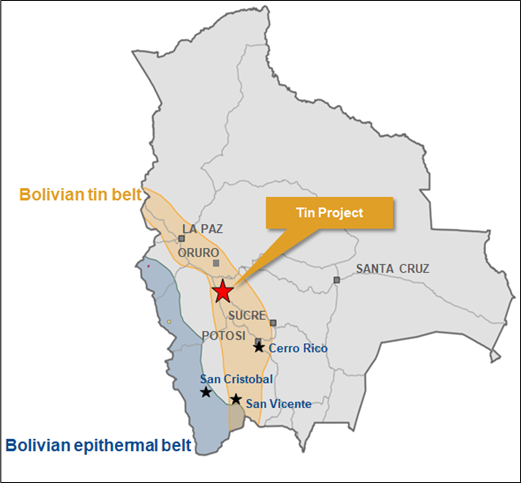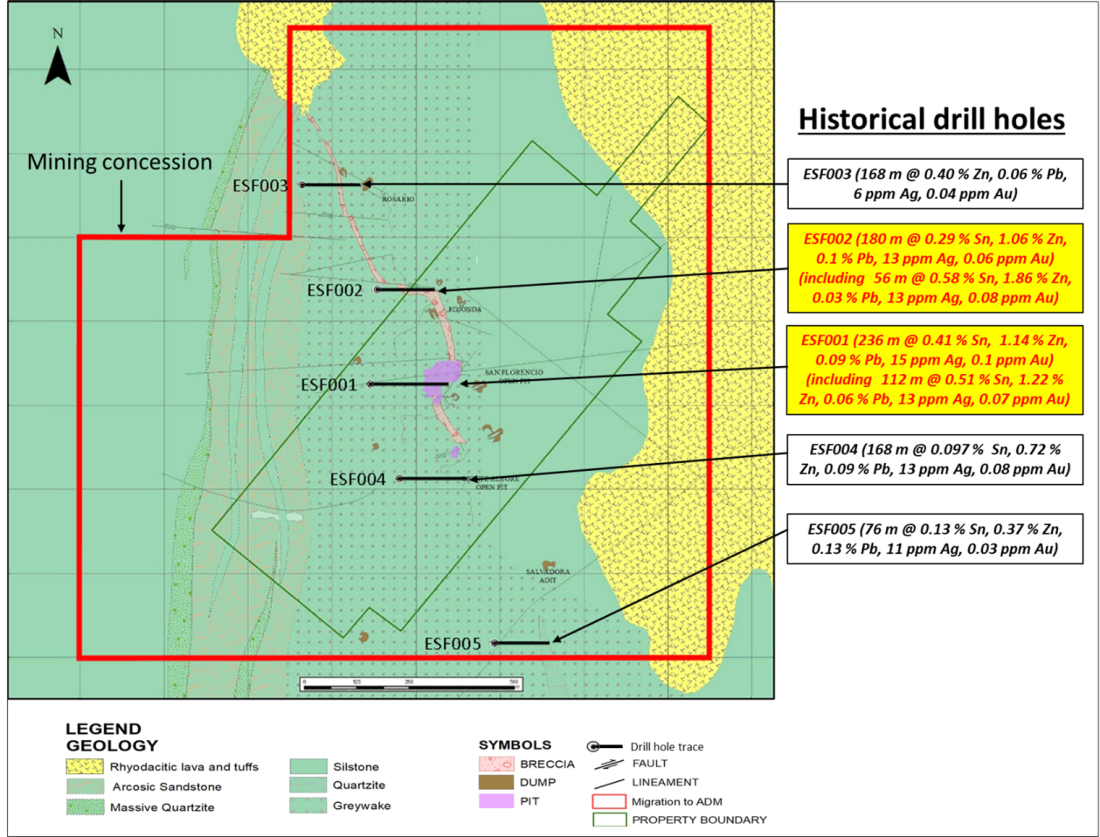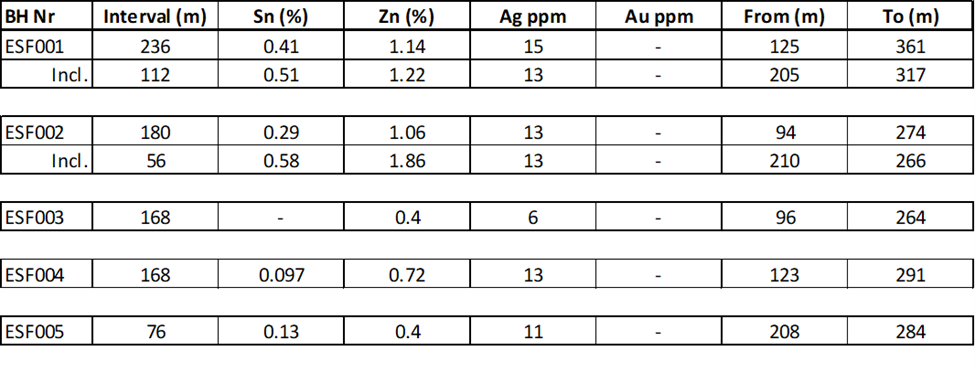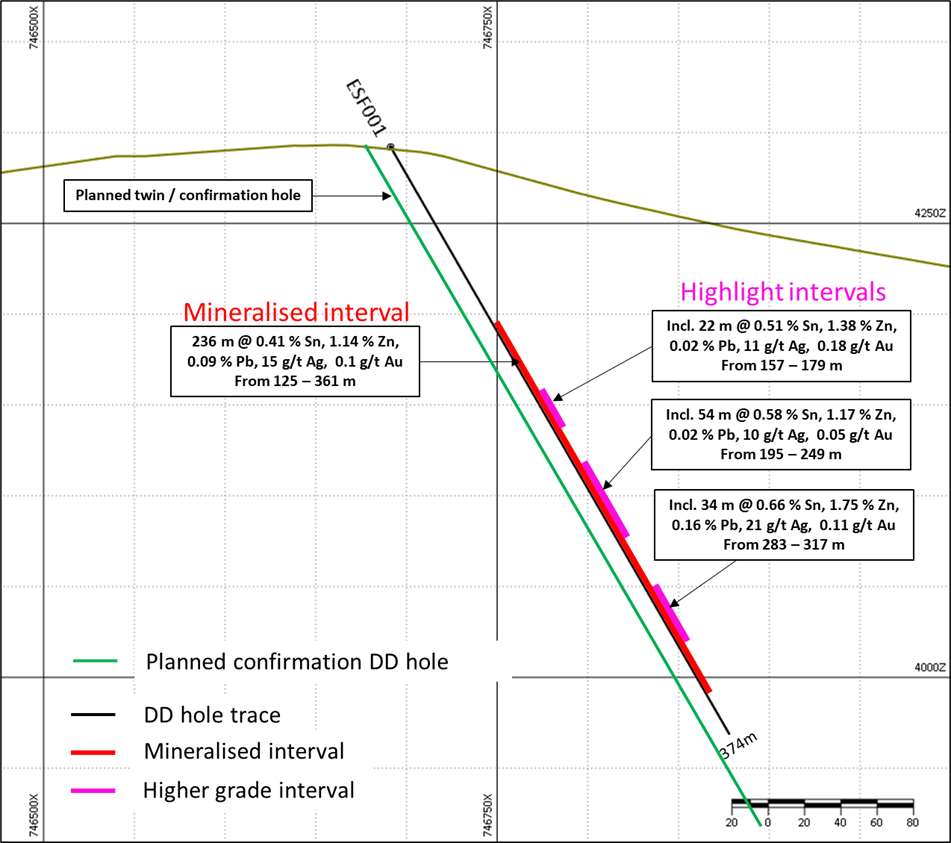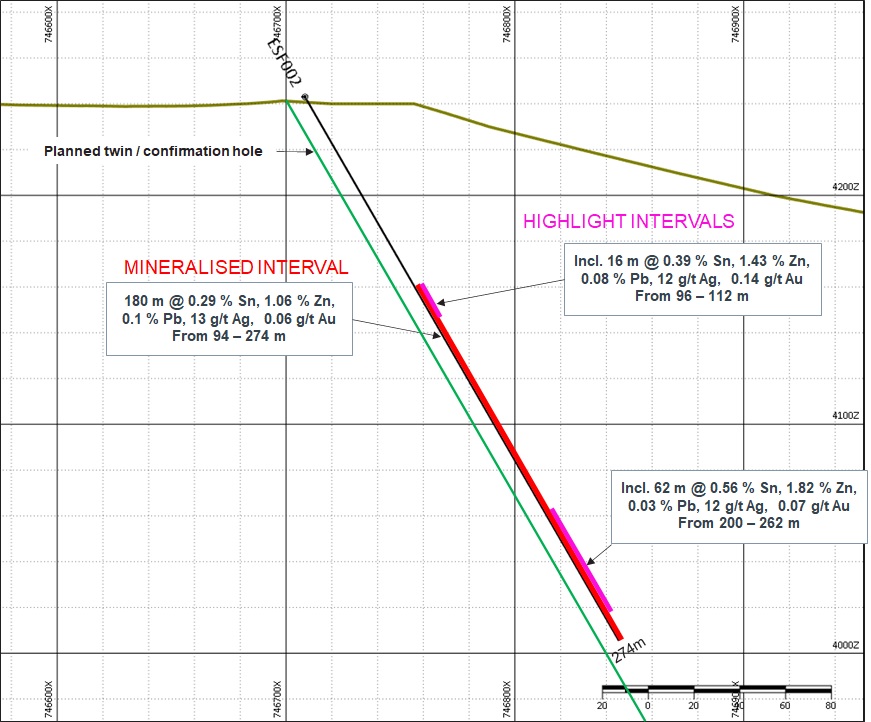Vancouver, British Columbia: Whitehorse Gold Corp. (“Whitehorse Gold” or the “Company”) (TSXV: “WHG”, OTCQX: “WHGDF”) announces that its wholly-owned subsidiary, Stannum Metals Corp., has signed agreements to acquire a 100% interest in a private Bolivian incorporated mining company (the “Tin Company”) from its three shareholders (the “Vendors”), free of any debt (the “Agreements”). The Vendors are Bolivian nationals and arm’s length parties.
The primary asset of the Tin Company is a tin-zinc-silver-lead polymetallic mineral project or ATE (Temporary Special Authorization) located in the Oruro Department, Bolivia. The property was subjected to some small-scale, historic mining and was explored and drilled by Rio Tinto in 1999.
Two historical drill holes by Rio Tinto intercepted significant tin mineralization. Drill hole ESF001 intercepted a 236 m interval (from 125 m to 361 m) grading 0.41% tin, 1.12% zinc, and 15 grams per tonne silver. Drill hole ESF002 intercepted a 180 m interval (from 94 m to 274 m) grading 0.29% tin, 1.06% zinc, and 13 grams per tonne silver, including a 56 m interval grading 0.58% tin, 1.86% zinc and 13 grams per tonne silver.
Major Terms of the Two Agreements
Confirmation Drilling Agreement:
The Company will pay US$100,000 to the Vendors as an initial, non-refundable, fee to conduct a confirmation drill program. The program will twin two historical holes over the next three months.
Acquisition Agreement:
The Company will pay a total of US$3.65 million to acquire 100% of the Tin Company in the following instalments:
- Subject to satisfactory drill results (at the determination of Whitehorse Gold), a further US$400,000 shall be paid to the Vendors to have a 100% interest in the Tin Company transferred to Whitehorse Gold’s subsidiary, Stannum Metals Corp.
- US$1.25M on the first anniversary of the acquisition agreement.
- US$1.25M on the second anniversary of the acquisition agreement, plus an additional US$500,000 in cash or Whitehorse Gold shares.
- A finder’s fee of US$250,000 will be paid in this transaction
- Failure to make full payment will result in 100% interest reverted back to the Vendors.
Closing of the transaction is subject to regulatory approval and other conditions as set out in the Agreements.
“Tin is a green metal and an essential component in every electronic circuit board made in the world. The tin market has seen exponential gains in the past couple of years and is projected to see further growth as electrification with decarbonization advances globally,” said Gordon Neal, Whitehorse Gold’s CEO, “With our team’s previous successful experience in exploring in Bolivia, we believe that this tin project will be another successful exploration venture.”
Property Location Map
Location and History
At an elevation of approximately 4,200 metres, the Property covers an area of approximately 2.0 square kilometres (km). The property is located in both the Oruro and Potosi Departments of Bolivia, approximately 65 km northeast of the Huanuni Mine, the largest tin mine in Bolivia and the largest cassiterite deposit in the world. Access is relatively easy through a paved road of 45 km from Oruro and a gravel road of 25 km.
Historical Exploration and Mineralization
Host rocks of the mineralization are Silurian-aged quartz sandstone (referred to as quartzite) and arkosic sandstone of the Llallagua Formation, which sits on top of greywacke of the Cancañiri Formation. Tin mineralization extends over 2 kilometres long appears to strike North-North-West, and is steeply-dipping to the west.
In 1999, Rio Tinto conducted a 7 diamond drill hole program (including 5 holes completed on the Property). A plan map of the historic drill locations and a table of the results can be seen below:
Plan view of historic drill holes
Table 1: Historic Drill Results
(Source: EMICRUZ, 1999 report)
Cross-section showing historic drill hole ESF001
Cross-section showing historic drill hole ESF002
Donald J. Birak, independent consultant geologist and Qualified Person as defined under National Instrument 43-101, has conducted a site visit to this property and has reviewed and approved the scientific and technical information in this news release. As no intact, historic core or assay samples exist for inspection or resampling, the Qualified Person was not able to validate the historic drill results and is therefore relying on the historic results as indicative of the property’s potential.
Confirmation Drilling
As per the recommendations of the Qualified Person and under the terms of the Confirmation Drilling Agreement, the Company will carry out a confirmation drilling program to twin two historical drill holes. The Company has commenced the process of assembling a Bolivian team and contracting a drilling rig to complete the confirmation drilling. This drill program will be implemented under industry best practices to assure the quality of drill results.
Board Appointment
Whitehorse Gold is pleased to announce the addition of Hernan Uribe to its board of directors. Mr. Uribe is a professional geologist with more than 25 years of experience in mineral exploration. He has worked with Billiton, Eaglecrest Exploration, New World Resources Corp, Apogee Minerals Corp, Lydian International, and New Pacific Metals Corp. Mr. Uribe is experienced in exploration and mining projects for gold-copper deposits, silver–lead–zinc polymetallic deposits, and lithium brines in Bolivia, Chile, Argentina, Peru, and Republic of Georgia, in various stages from exploration to development, with roles of Exploration Geologist, Chief Geologist, Exploration Manager, and Country Manager. Mr. Uribe received his degree in Geology from the University of La Paz, Bolivia, and conducted several courses of mineral exploration and mineral deposits evaluation.
About Whitehorse Gold
Whitehorse Gold is a mineral exploration and development company focusing on tin projects in Bolivia and a gold development project in the Yukon. The company has the right to acquire a 100% interest in a tin project 65 km southeast of Oruro Bolivia. The company also owns 100% of the Skukum Gold project located in southern Yukon, approximately 55 km south-southwest of Whitehorse. The Skukum Gold project hosts the formerly producing Mt. Skukum high-grade gold mine. Project infrastructure includes an all-weather access road, a 50-person camp, approximately 6 kms of underground development, and a previously operating 300-tpd mill and associated support facilities. Underground operations by a previous operator at Mt. Skukum from 1986 to 1988 saw 233,400 tons of ore mined and processed to recover approximately 79,750 ounces of gold (Total Energold Corporation, 1989).
On Behalf of Whitehorse Gold Corp.
signed “Gordon Neal”
Gordon Neal, CEO & Director
For further information please contact:
Investor Relations, Whitehorse Gold Corp.,
Phone: (604) 336-5919
Email:info@whitehorsegold.ca
www.whitehorsegold.ca
Neither the TSX Venture Exchange nor its Regulation Services Provider (as that term is defined in the policies of the TSX Venture Exchange) accepts responsibility for the adequacy or accuracy of this news release.
CAUTIONARY DISCLAIMER - FORWARD LOOKING STATEMENTS
Certain of the statements and information in this press release constitute “forward-looking statements” within the meaning of the United States Private Securities Litigation Reform Act of 1995 and “forward-looking information” within the meaning of applicable Canadian provincial securities laws. Any statements or information that express or involve discussions with respect to predictions, expectations, beliefs, plans, projections, objectives, assumptions or future events or performance (often, but not always, using words or phrases such as “expects”, “is expected”, “anticipates”, “believes”, “plans”, “projects”, “estimates”, “assumes”, “intends”, “strategies”, “targets”, “goals”, “forecasts”, “objectives”, “budgets”, “schedules”, “potential” or variations thereof or stating that certain actions, events or results “may”, “could”, “would”, “might” or “will” be taken, occur or be achieved, or the negative of any of these terms and similar expressions) are not statements of historical fact and may be forward-looking statements or information. Forward-looking statements or information relate to, among other things: the price of gold and other metals; the accuracy of mineral resource and mineral reserve estimates at the Company’s material properties; the sufficiency of the Company’s capital to finance the Company’s operations; estimates of the Company’s capital expenditures; timing of receipt of permits and regulatory approvals; availability of funds from production to finance the Company’s operations; and access to and availability of funding for future construction, use of proceeds from any financing and development of the Company’s properties.
Forward-looking statements or information are subject to a variety of known and unknown risks, uncertainties and other factors that could cause actual events or results to differ from those reflected in the forward-looking statements or information, including, without limitation, social and economic impacts of COVID-19; risks relating to: fluctuating commodity prices; calculation of resources, reserves and mineralization and precious and base metal recovery; interpretations and assumptions of mineral resource and mineral reserve estimates; exploration and development programs; feasibility and engineering reports; permits and licenses; title to properties; property interests; joint venture partners; acquisition of commercially mineable mineral rights; financing; recent market events and conditions; economic factors affecting the Company; timing, estimated amount, capital and operating expenditures and economic returns of future production; integration of future acquisitions into the Company’s existing operations; competition; operations and political conditions; regulatory environment in Canada and Bolivia; environmental risks; legislative and regulatory initiatives addressing global climate change or other environmental concerns; foreign exchange rate fluctuations; insurance; risks and hazards of mining operations; key personnel; conflicts of interest; dependence on management; internal control over financial reporting; and bringing actions and enforcing judgments under U.S. securities laws.
This list is not exhaustive of the factors that may affect any of the Company’s forward-looking statements or information. Forward-looking statements or information are statements about the future and are inherently uncertain, and actual achievements of the Company or other future events or conditions may differ materially from those reflected in the forward-looking statements or information due to a variety of risks, uncertainties and other factors, including, without limitation, those referred to in the Company’s Annual Information Form for the year ended March 24, 2022, under the heading “Risk Factors”. Although the Company has attempted to identify important factors that could cause actual results to differ materially, there may be other factors that cause results not to be as anticipated, estimated, described or intended. Accordingly, readers should not place undue reliance on forward-looking statements or information.
The Company’s forward-looking statements and information are based on the assumptions, beliefs, expectations and opinions of management as of the date of this press release, and other than as required by applicable securities laws, the Company does not assume any obligation to update forward-looking statements and information if circumstances or management’s assumptions, beliefs, expectations or opinions should change, or changes in any other events affecting such statements or information. For the reasons set forth above, investors should not place undue reliance on forward-looking statements and information.
Cautionary Note to US Investors
The disclosure in this news release and referred to herein was prepared in accordance with NI 43-101 which differs significantly from the requirements of the U.S. Securities and Exchange Commission (the "SEC"). The terms “proven mineral reserve”, “probable mineral reserve” and “mineral reserves” used in this news release are in reference to the mining terms defined in the Canadian Institute of Mining, Metallurgy and Petroleum Standards (the “CIM Definition Standards”), which definitions have been adopted by NI 43-101. Accordingly, information contained in this news release providing descriptions of our mineral deposits in accordance with NI 43-101 may not be comparable to similar information made public by other U.S. companies subject to the United States federal securities laws and the rules and regulations thereunder.
Investors are cautioned not to assume that any part or all of mineral resources will ever be converted into reserves. Pursuant to CIM Definition Standards, “Inferred mineral resources” are that part of a mineral resource for which quantity and grade or quality are estimated on the basis of limited geological evidence and sampling. Such geological evidence is sufficient to imply but not verify geological and grade or quality continuity. An inferred mineral resource has a lower level of confidence than that applying to an indicated mineral resource and must not be converted to a mineral reserve. However, it is reasonably expected that the majority of inferred mineral resources could be upgraded to indicated mineral resources with continued exploration. Under Canadian rules, estimates of inferred mineral resources may not form the basis of feasibility or pre-feasibility studies, except in rare cases. Investors are cautioned not to assume that all or any part of an inferred mineral resource is economically or legally mineable. Disclosure of “contained ounces” in a resource is permitted disclosure under Canadian regulations; however, the SEC normally only permits issuers to report mineralization that does not constitute “reserves” by SEC standards as in place tonnage and grade without reference to unit measures.
Canadian standards, including the CIM Definition Standards and NI 43-101, differ significantly from standards in the SEC Industry Guide 7. Effective February 25, 2019, the SEC adopted new mining disclosure rules under subpart 1300 of Regulation S-K of the United States Securities Act of 1933, as amended (the “SEC Modernization Rules”), with compliance required for the first fiscal year beginning on or after January 1, 2021. The SEC Modernization Rules replace the historical property disclosure requirements included in SEC Industry Guide 7. As a result of the adoption of the SEC Modernization Rules, the SEC now recognizes estimates of “Measured Mineral Resources”, “Indicated Mineral Resources” and “Inferred Mineral Resources”. In addition, the SEC has amended its definitions of “Proven Mineral Reserves” and “Probable Mineral Reserves” to be substantially similar to corresponding definitions under the CIM Definition Standards. During the period leading up to the compliance date of the SEC Modernization Rules, information regarding mineral resources or reserves contained or referenced in this news release may not be comparable to similar information made public by companies that report according to U.S. standards. While the SEC Modernization Rules are purported to be “substantially similar” to the CIM Definition Standards, readers are cautioned that there are differences between the SEC Modernization Rules and the CIM Definitions Standards. Accordingly, there is no assurance any mineral reserves or mineral resources that the Company may report as “proven mineral reserves”, “probable mineral reserves”, “measured mineral resources”, “indicated mineral resources” and “inferred mineral resources” under NI 43-101 would be the same had the Company prepared the reserve or resource estimates under the standards adopted under the SEC Modernization Rules.

